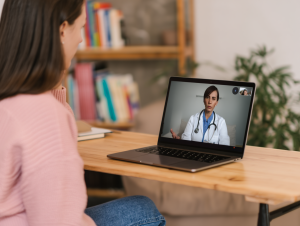Is Online Therapy Real Therapy?
Can you really connect with someone through a screen? Can meaningful healing happen when you’re sitting in your car or your living room instead of a therapist’s office? Are you getting the “real thing” when therapy happens online?
At Televero Health, we hear these questions regularly from people who want help but worry that virtual therapy might be a watered-down version of “real” support. People who value mental health care but wonder if something essential gets lost when therapy moves online.
If you’ve been hesitating to try online therapy because it doesn’t seem as legitimate or effective as in-person care, let’s talk about what the experience actually offers.
The Concern Is Natural
First, your question makes perfect sense. Therapy has traditionally happened face-to-face in an office setting. For generations, that’s what therapy looked like in our cultural imagination. So it’s natural to wonder if something important is lost when that format changes.
Plus, we all know that some things just don’t translate well to digital formats. We’ve all had enough awkward Zoom calls and lagging video chats to know that technology doesn’t always capture the richness of human connection.
So it’s a fair question: Can therapy – something deeply personal that relies on human connection – work well in a virtual environment?
What Research Tells Us
Here’s what might surprise you: Online therapy has been studied for over 20 years, and the research consistently shows that for many common issues, it can be just as effective as in-person therapy.
Studies have found that:
People often form equally strong therapeutic relationships with online providers as they do with in-person therapists.
Treatment outcomes for issues like depression, anxiety, and PTSD can be comparable between virtual and in-person formats.
Some people actually open up more quickly in online sessions, feeling less self-conscious than they might in an office setting.
The key factors that make therapy effective – the therapeutic relationship, the therapist’s skill, the client’s engagement – remain just as important in virtual therapy as they are in person.
This doesn’t mean online therapy is identical to sitting in the same room with someone. The experience does differ in some ways. But different doesn’t necessarily mean less effective.
The Unexpected Benefits of Virtual Care
What many people discover when they try online therapy is that it comes with unique advantages they hadn’t considered:
Comfort in your own space: Having sessions in your familiar environment can help you feel more at ease and able to open up.
No commute stress: You don’t have to rush through traffic, find parking, or sit in a waiting room – reducing barriers to consistent attendance.
More flexible scheduling: Many people find it easier to fit therapy into busy lives when they can do it from home or even during a lunch break.
Broader access to specialists: You’re not limited to therapists within driving distance, which means you can find someone with expertise in your specific needs.
Reduced stigma: Some people feel more comfortable getting help when they don’t have to worry about being seen entering a therapist’s office.
Real-life context: Your therapist gets glimpses into your actual environment, sometimes providing valuable insights that wouldn’t be available in an office setting.
At Televero Health, we’ve seen these benefits make therapy possible for people who otherwise couldn’t access care – people in rural areas, people with physical limitations, parents who can’t find childcare, professionals with demanding schedules.
What About the Human Connection?
The biggest concern many people have about online therapy is whether that essential human connection can happen through a screen. Can you really form a meaningful relationship with someone you’ve never met in person?
What we’ve found is that while the connection forms differently online, it can grow just as deep and supportive. Video allows for eye contact, facial expressions, tone of voice, and body language – all important elements of human communication.
Many of our clients report feeling deeply seen and understood by their online therapists. They describe relationships that feel genuine, supportive, and transformative – all the qualities we hope for in any therapeutic connection.
And for some people, the slight distance of virtual connection actually helps them open up more freely than they might in person. They feel less exposed, less scrutinized, and therefore more able to be vulnerable.
Is Online Therapy Right for You?
Online therapy isn’t the perfect fit for every person or every situation. There are some cases where in-person care may be more appropriate – particularly for certain high-risk situations or specialized treatments.
But for many common challenges – anxiety, depression, stress, relationship issues, life transitions – virtual therapy can offer support that’s every bit as “real” and effective as traditional in-office care.
The most important factor isn’t whether therapy happens in person or online. It’s whether you connect with your therapist, engage in the process, and feel that the format works for your specific needs.
At Televero Health, we believe that the most effective therapy is the one you’ll actually do consistently. If online therapy makes it possible for you to get support when in-person care isn’t practical or accessible, that’s not a compromise – it’s a pathway to the help you deserve.
Ready to experience effective therapy that fits your life? Start here.
